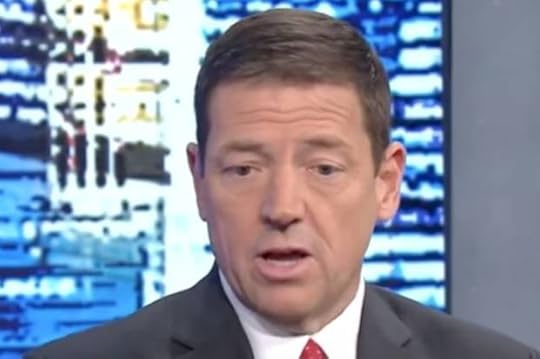Helen H. Moore's Blog, page 251
November 3, 2017
CNN contributor: “Stop all immigration right now”

Ed Martin (Credit: YouTube)
As more is revealed about Sayfullo Habibullaevic Saipov, the man accused of killing eight people after driving a truck into a bike path in New York City Tuesday, we’re getting more anti-immigration takes from conservatives.
Thursday during CNN’s “Newsroom with Brooke Baldwin,” host Baldwin explained that Saipov was brought in based on merit through the U.S.’s diversity visa program.
“This wasn’t some random lottery,” she said. “He was allowed to come in through some sort of vetting process in 2010 from Uzbekistan. He goes to — in Ohio, and Tampa, and New Jersey where ultimately because of social media and reading all this ISIS propaganda and following instructions to a ‘T’ on how to run people over, the guy goes and gets this Home Depot truck and kills these eight people because of what he’s learned on his computer sitting in America.”
Ed Martin, CNN political contributor and co-author of the book “The Conservative Case for Trump,” responded. “My retort would be that system is broken,” he said. “Whatever the merit is that we thought we need to let this gentleman in.”
Martin added that the U.S. should “stop all immigration right now.” He continued, “I don’t believe that we need immigrants to come to drive Uber cars. I don’t think we need that. I think we have lots of people who can drive Uber cars like this guy did.”
Baldwin challenged him, saying “I don’t think we should stop all immigration right now and not allow immigrants to be employed.”
Martin bit back, “Well, I think we should stop having people drive over eight people and kill them, so I’m willing to take a chance on that side of less immigration, a lot less.”
On Twitter, Martin said yesterday that “Chain migration must end! #AmericaFirst means first make sure middle class workers have jobs.”
Chain migration must end! #AmericaFirst means first make sure middle class workers have jobs. Thank you, @POTUS! #MAGAhttps://t.co/Iz3Ix11UlY
— Ed Martin (@EagleEdMartin) November 2, 2017
Martin’s comments are perhaps something we should expect to see on Fox News or President Donald Trump’s Twitter feed. By appearing on CNN, a nominally “Facts First” news organization, however, they get extra and unacceptable validation.
It’s reflective of just how dangerous and outdated CNN’s ongoing efforts to promote “both sides” of the national discussion are. The job of journalists and journalism is not to placate all viewers, but to present the truth. That has rarely been so important as it is now.
Letting a talking head vilify and reduce immigrants to needless Uber drivers on air is not putting “Facts First.”
The SalonTV Rewind

1. Bill Nye “I’m A Failure”: Bill Nye The Science guys discusses his climate change education efforts: Watch here.
2. A Guide to Surviving Trump: Comedian, author and The View host Joy Behar shares her A-Z guide for surviving this White House. Watch here.
3. Soja Previews Their New Album: The D.C. reggae fusion band performs “Bad News” of their new album “Poetry in Motion” live on Salon Stage. Watch here.
4. Life After the Manson “Family”: Former Manson girl Dianne Lake talks about life in and after the cult, and being the teen who helped lock up Charles Manson. Watch here.
5. The Trump Relation to Nixon: Author and MSNBC host Chris Matthews discusses the ways the Trump investigation reminds him of Watergate. Watch here.
For more great content visit the SalonTV Channel
Nearly half of Americans believe Trump committed a crime: poll

(Credit: Getty/Ralph Freso)
President Donald Trump may be apprehensive about the ongoing probe by special counsel Robert Mueller III, and a new survey suggests that at least when it comes to the views of the American public, he has good reason to be.
Forty-nine percent of Americans surveyed in a new Washington Post-ABC News poll believe that Trump likely committed a crime related to the alleged Russian attempts to meddle in the 2016 election, according to The Washington Post. While more of these individuals believe this due to suspicion rather than the available evidence, other numbers indicate that Trump’s image has taken a hit due to Mueller’s probe.
For instance, despite Trump’s attempts to discredit the Mueller probe, 58 percent of Americans approve of how the special prosecutor has handled the investigation, with only 28 percent disapproving of Mueller’s performance. Fifty-three percent of the respondents said that the charges and plea by George Papadopoulos — a former Trump adviser who, unlike Paul Manafort and Rick Gates, is confronting matters that directly pertain to alleged interactions with Russia on behalf of Trump’s campaign — reflect a wider scandal within Trump’s campaign.
Not surprisingly, there is a strong partisan split in the results. Seventy-eight percent of Democrats approve of Mueller’s investigation while only 38 percent of Republicans feel likewise. Then again, 56 percent of independents approve of Mueller’s performance, suggesting that the overall tide is running against Trump on the issue of the Russia scandal.
Even worse for Trump, Republicans have joined Democrats in supporting the charges against former campaign manager Paul Manafort and his former business associate Rick Gates. Fifty-seven percent of Republicans and 78 percent of Democrats feel that way.
The Virginia governor’s race is proof Trump has made our politics worse

Ed Gillespie (Credit: Getty/Sara D. Davis)
Ed Gillespie, the Republican gubernatorial nominee in Virginia, is providing conclusive proof that party officials have realized that their old plans of running on tax cuts and reducing regulations simply will not work.
Gillespie was force-fed this lesson in June when he defeated Corey Stewart in the Republican primary by about 4,300 votes. Conventional polling leading up to the GOP primary had Gillespie heavily favored to win, but Stewart’s courting of Confederate monument lovers via “alt right” rhetoric combined with low turnout almost led to his victory.
As New York Times columnist Thomas B. Edsall noted earlier this week, “Gillespie got the message loud and clear: The populist right-wing was much stronger than he had thought. If a substantial number of the 155,466 voters for Stewart stayed home on Nov. 7, the Gillespie campaign was dead.”
Chastened by his near-loss, the veteran lobbyist has been trying to figure out a way to mobilize Stewart’s voters without causing too much of a stir in Northern Virginia, home of many educated government workers and contractors who have made it so that President Donald Trump has a 60 percent disapproval rating in the state.
Like Trump, Gillespie, a former chairman of the Republican National Committee, has turned to misleading advertising about immigration and crime, even as he casts a very different tone in public appearances. The strategy has been powered by Jack Morgan, the president’s former field director who also is a preacher/self-defense instructor. Morgan also believes that America is on the brink of another Civil War and that communists are behind the nationwide efforts to remove memorials to Confederate political figures.
And it might just work, too, since his Democratic opponent, Ralph Northam, seems to be running a strategy that is a carbon copy of the low-key campaign that Hillary Clinton ran in 2016 against Trump.
In September, Gillespie rolled out a political ad claiming that Northam had “cast the deciding vote in favor of sanctuary cities” which the narrator linked to a Central American gang. “MS-13’s motto is kill, rape, control,” the narrator says.
And while it is true that Northam had voted against a bill that would have prohibited Virginia cities from trying to erect judicial barriers to cooperating with federal immigration authorities, the ad did not mention that Virginia has no localities which engage in this practice. The ad also does not mention that crime in general and violent crimes in particular have been declining for years within the state.
In October, Gillespie went after Northam for a policy which the state’s current governor, Terry McAuliffe, had put into place which enabled 26,000 convicted felons who had served their sentences to be able to vote again in elections.
After linking Northam to a repeated sex offender in the ad, the Gillespie then appears on-screen to note that he also supports restoring voting rights to felons. Gillespie does not disclose to viewers that on his own website, he says that he would not discriminate against sex offenders in his policy.
After these two ads appeared, a group called the Latino Victory Fund decided to turn Gillespie’s own fire back on him, creating an ad that features a burly white pickup truck driver chasing around Hispanic and Muslim children with an Ed Gillespie bumper sticker on his vehicle and a Confederate flag waving on the back.
Gillespie and his right-wing media allies have rushed to condemn the divisive ad but without acknowledging that it was he who created the climate in which it could run. The spot was pulled on Oct. 31 after a terrorist utilized a truck to mow down pedestrians in New York City.
Should Gillespie’s attacks pay off for him next Tuesday, expect Republicans nationwide to double down on them.
Our planet’s carbon dioxide levels are rising at “record-breaking speed”

This Nov. 16, 2015 photo shows a section of the Mississippi Power Co. carbon capture power plant in DeKalb, Miss. Carbon capture entails catching the carbon emissions from a power plant or cement or steel factory and injecting them underground for permanent storage. (AP Photo/Rogelio V. Solis) (Credit: AP)
A new report from the United Nations World Meteorological Organization warns that global carbon dioxide levels rose at the fastest rate ever measured in 2016 — reaching heights unseen in at least 4.5 million years. That’s before humans existed.
Over the past century, carbon dioxide levels have continued to speed upwards. The report says CO2 levels increased by 3.3 parts per million last year. Since the Industrial Revolution, CO2 has risen roughly “10 to 20 times faster” than the fastest rate in Earth’s history.
The report comes just days before negotiators convene in Bonn, Germany, to consider progress under the Paris Agreement to limit greenhouse gas emissions. Though lauded when it was reached in 2015, that pact is widely considered insufficient to meet goals to limit warming to “well below 2 degrees Celsius.” After examining climate action around the world, one recent analysis placed our odds of failing to meet that target at more than 99.5 percent. In a word, unlikely.
The Trump administration announced earlier this year that it would be withdrawing from the Paris Agreement in 2020 — as soon as it is legally allowed to do so. That would put the United States and Syria as the only countries in the world outside its scope.
You don’t need to be a shrink to understand Trump’s mind

(Credit: Photo by Win McNamee/Getty Images)
Everybody knows that Donald Trump is mentally disturbed. His mental illness is hiding in plain sight. Someone who can never admit a mistake or show remorse or guilt is unbalanced. Someone who frequently brags and demeans others is emotionally insecure and volatile. And someone who appears to lack empathy invariably has something missing inside. No one has to go out on a limb to know that these things are true.
When I say that “everybody knows,” I realize that that isn’t literally true. Many people seem to like and admire Trump, and likely believe that critiques of his psychological stability originate from the liberal media and his political opponents. Instead, when I say that “everybody knows” Trump is disturbed, I’m saying you don’t need to be a trained psychiatrist or psychologist to believe that he is riddled with extreme emotional conflicts that hamper his ability to be a responsible leader. You just need some combination of common sense, intuition and empathy. Most psychotherapists understand their clients with just such tools. In this sense, analyzing Trump’s mind is almost as easy for the lay person as for the so-called expert.
For example, is anyone surprised that someone who smiles and clowns around all the time might be hiding depression or sadness? Or that a bully might secretly feel weak and scared? Or that a braggart is likely defending him or herself against feelings of insecurity or inferiority? Or that an abuser might have been abused as a child? These inferences don’t require speculative diagnostic leaps or specialized psychiatric knowledge, but are knowable through the ordinary emotional intelligence that guides us in normal social life.
We’re put-off by the braggart because we sense he has an urgent need to show off and turn us from peers to admirers. It isn’t hard to assume that braggarts must be secretly insecure, so much so that they need to constantly proclaim the opposite. A coach in the National Basketball Association, Greg Popovich, nailed what everyone already knew when he said of Trump, “This man in the Oval Office . . . thinks he can become large by belittling others.” Like Popovich, people need to trust their perceptions and intuitions about what makes Donald Trump tick.
Given the huge amount of information we have about Trump — his over 30,000 tweets, biographies, long record of public life, frequent leaks about the inner workings of the West Wing, etc. — certain common sense inferences about his mental state are easy to make. For example, Trump seems unable to tolerate guilt or remorse, refusing to ever admit a mistake or failure. He never said anything sexist, his administration is never chaotic, his response to the devastation in Puerto Rico scores a “10,” and, naturally, he never said anything to insult a Gold Star widow or give license to white supremacist groups after Charlottesville. Nothing is ever his fault — ever. Why is that? Do we really need shrinks to tell us that Donald Trump seems unable to tolerate any feeling of failure, guilt, or shame? I think that most of us intuitively understand that when people compulsively and defensively justify themselves in response to any hint of failure or criticism, they’re allergic to feelings or insinuations that they have done or said something “bad,” something disappointing, something imperfect. And the intensity of Trump’s defensiveness must, of course, be a measure of the degree to which these underlying negative feelings feel intolerable.
The resulting picture of Trump’s psychology can be simply and readily drawn by any observer. This is a man who cannot tolerate feelings of inferiority, helplessness, shame and/or guilt and reflexively and compulsively responds to any inkling of these feelings by exaggerated public displays of their opposite. People don’t need to defer to so-called “experts” to know this.
Most psychotherapists believe that this need to exaggerate the opposite of a painful, troubling feeling is probably inherent in mental functioning. All of us, not just Trump, go out of our way to reduce the threat of distressing feelings and beliefs. We seek psychological safety, which is often temporarily found in the defensive, but reassuring, assertion of attitudes that directly negate what really most troubles us. This is why we often find abuse in the childhoods of adult abusers. Traumatic feelings of helplessness experienced as a child are later denied and negated by the abuser exercising his or her power to abuse someone else. Similarly, it wouldn’t surprise most people to know that people who are extremely extroverted on the outside might be secret introverts.
It’s commonly reported — and evident to most of us — that when Trump feels insulted, he hits back twice as hard. He has felt insulted by, and therefore attacked, Hillary Clinton, Barack Obama, senators Mitch McConnell and John McCain, James Comey, Jeff Sessions, North Korean leader Kim Jong-un, Australian Prime Minister Malcolm Turnbull, Mexican president Enrique Pena Nieto, various federal judges, the New York Times and Washington Post, CNN, NBC, Arnold Schwarzenegger, Rosie O’Donnell, Meryl Streep, the mayor of San Juan, Puerto Rico, Secretary of State Rex Tillerson, and recently, a congresswoman friend of a Gold Star mother — to name just a few. But saying he “hits back twice as hard” almost glorifies Trump as a pugilist rather than describing an extreme reaction to extremely painful, even intolerable feelings of guilt and shame that unfortunately accompany the inevitable imperfections and failures of life, particularly of political life. That Trump finds imperfection and failure intolerable is hardly a wild professional speculation, but instead reflects the common sense awareness that sometimes people avoid negative feelings by exaggerating their opposite.
This universal psychological tendency poses a problem if it is too extreme or compulsive. Trump, for example, seems unable to not strike out if he is made to feel even a little bit of shame, guilt, or failure. Such a reflex makes friendship, collegiality, compromise, or diplomacy impossible — significant problems in a chief executive. An ordinary person afflicted with such a reflex would likely suffer social isolation, problems working with others, difficulties parenting, and an inability to be intimate. For a president within reach of the nuclear football, this reflex can obviously have much more catastrophic consequences.
When I argue that Trump’s psychopathology is hiding in plain sight and that it is easily discerned using common sense, I mean to argue that, while having the imprimatur of mental health professionals’ diagnostic skills is useful, it is not necessary for understanding Trump’s emotional life. A professional might use a diagnostic label such as narcissistic personality disorder to describe him, but the label doesn’t add much to the notion, easily seen by lay people, that Trump inflates his power and importance to cover up a deep-seated sense of inferiority and insecurity. In fact, this latter insight tells us more about what makes Trump tick than the label does.
As far as diagnostic labeling of Trump is concerned, the diagnosis most often used to describe him — narcissistic personality disorder — is easy for a lay person to apply. You need only to refer to the bible of psychiatric diagnosis, The Diagnostic and Statistical Manual of Mental Disorder, or DSM, and look up the label that most seems to fit — in this case, the narcissistic personality — and read the criteria. The fourth edition of the DSM says that someone has this disorder if he or she meets five of the following seven criteria:
Has a grandiose sense of self-importance
Is preoccupied with fantasies of unlimited success, power, brilliance, beauty
Believes that he is “special” and unique and can only be understood by other special or high status people
Requires excessive admiration
Has a sense of entitlement
Is interpersonally exploitive
Lacks empathy.
Trump obviously qualifies. You just check the boxes and you have yourself a diagnosis. The DSM-IV tells you that Trump suffers from 301.81, narcissistic personality disorder. No inferences or speculations are required.
The problem is that once you’ve reached the diagnosis, you have to understand what this means and how it might help you predict his behavior. To do this, however, you must invariably return to the model of mental functioning described earlier in which people are understood as striving to feel safe from distressing feelings and beliefs by emphasizing their opposite. Using this paradigm, it’s then possible to predict, for example, that every time Trump is defeated or one-upped, whether by Congress, the media, or a foreign power, he will be powerfully compelled to strike out. Given the power he has, it is at these moments that Trump will be most dangerous and most likely to act recklessly and without regard for limits or reality.
So what’s all the fuss about this thing called the Goldwater Rule, the ethical principle passed in 1973 by the American Psychiatric Association, ratified later by the American Psychological Association, that enjoins mental health professionals from offering a professional opinion about public figures they have not examined in person, and from whom they have not obtained consent to discuss their mental health in public statements? A recent book, Duty to Warn, persuasively argues that there is a higher ethical principle that supersedes the Goldwater Rule — namely, therapists’ responsibility to protect potential victims from the harm posed by someone suffering from an obvious mental illness. Twenty six mental health professionals show in detail how Trump’s psychiatric illness poses just such a threat to the public, rendering as morally suspect any refusal to warn people about the danger posed by his disorder.
Psychotherapists of all stripes have legitimate expertise in treating people with mental disorders. But as far as weighing in publicly about politics, therapists are at their best when describing psychological dynamics that lie just beneath the surface in ways that everyone can relate to. In this way, most therapists use a sophisticated form of common sense.
Mental health professionals surely have a duty to warn and have access to an enormous amount of information upon which to diagnose Trump. But the truth of the matter is that lay people — all of us, in fact — do not need specialized experts to tell us what we can plainly see. It is plainly visible every day that Donald Trump is pressured to act out and defend himself against the painful threats posed by feelings of guilt, shame, inferiority, and helplessness, and that it is these defenses that produce his aberrant attitudes and actions. We should trust our intuitions and credit our own ability to analyze Trump’s personality and the irrational ways that it manifests itself.
Michael Bader is a psychologist and psychoanalyst in San Francisco. He is the author of “More Than Bread and Butter: A Psychologist Speaks to Progressives About What People Really Need in Order to Win and Change the World” (Blurb, 2015).
What new Russia investigation charges could mean for Trump

(Credit: AP/Getty/Salon)
Five months into Special Counsel Robert Mueller’s investigation of cooperation between Donald Trump’s campaign and Russia during the 2016 election, Americans are seeing the first legal maneuvers in the case.
Trump’s former campaign manager Paul Manafort and his business associate Rick Gates surrendered to U.S. District Court on Oct. 30, after being indicted by a grand jury. Both pleaded not guilty to 12 counts, including conspiracy.
Hours later, we learned a foreign policy advisor to the campaign, George Papadopoulos, pleaded guilty to lying to the FBI earlier in the month.
What does all of this mean?
For those of us who study presidential elections and administrations, the indictments offer a first look at the tangled web of financial relationships among the Trump campaign staff, and a newly revealed effort by the Russians to share “dirt” – including thousands of emails – on Hillary Clinton.
What about George Papadopoulos?
The news that George Papadopoulos pleaded guilty to lying to the FBI about meetings with individuals closely associated with the Russian government during the campaign is an important development in the ongoing investigation. It establishes an additional effort by Russia to contact the Trump campaign in an effort to help Trump win the presidency.
That we only learned about that plea today, when Special Counsel Robert Mueller is indicting Donald Trump’s former campaign manager, suggests Papadopoulos’s cooperation with the investigation is problematic for the president. Mueller filed a motion calling Papadopoulos a “proactive cooperator” and urged the court to maintain secrecy because Papadopoulos had agreed to provide information relevant to an ongoing investigation of Russian interference with the election.
Manafort and Gates: What did they do?
Manafort advised the 2016 presidential campaign of Donald Trump during the summer of 2016. He abruptly departed when details of his prior dealings with Ukraine’s Party of Regions and former Ukrainian President Viktor Yanukovych were made public.
Yanukovych was president of Ukraine during the time when the Ukrainian territory of Crimea was annexed by Russia in 2014. His party, backed by Russian oligarchs and supporters, opposed NATO and used inflammatory anti-Western rhetoric that may have endangered U.S. Marines. Corruption and widespread protests ultimately led Yanukovych to flee Ukraine for Russia. Earlier this year, he went on trial for treason. The prosecution alleges he wrote a letter to Vladimir Putin, requesting that troops be sent into Ukraine.
From 2004 to 2014, Paul Manafort earned millions advising the party and burnishing its reputation in the U.S. and other Western nations. He also forged relationships with the pro-Russian oligarchs who funded the party, organizing separate private business deals that earned him more millions.
Prior to his work in Ukraine, Manafort worked for some of the most unsavory dictators around the world, including Ferdinand Marcos in the Philippines, Jonas Savimbi in Angola and Mobutu Sese Seko in Zaire.
Rick Gates is described as Manafort’s “right-hand man” in these consulting activities and during his time with the Trump campaign.
Now, they each face 12 counts, including conspiracy to launder money, failure to register as a foreign agent and knowingly making false statements under the Foreign Agents Registration Act. The most eye-catching charge is “conspiracy against the United States,” defined as “knowingly and intentionally [conspiring] to defraud the United States by impeding, impairing, obstructing, and defeating the lawful governmental functions of a government agency, namely the Department of Justice and the Department of the Treasury, and to commit offensives against the United States.”
The indictment details efforts to launder money through multiple U.S. and foreign corporations and banks. It alleges that more than US$75 million flowed through the offshore accounts Manafort and Gates established.
Manafort’s efforts to lobby U.S. government officials on behalf of the Ukrainian government required that he register and report his activities and his income. The indictment alleges that both Manafort and Gates failed to do so. When asked, they allegedly misled U.S. authorities about the nature of their activities.
Is this the silver bullet President Trump’s opponents have been waiting for to prove the president worked with the Russians during the campaign? No.
While “conspiracy against the United States” is a big bold charge, the indictment focuses on activities that occurred before Manafort joined the campaign.
Prosecutors tend to go after the small fish first, in the hopes that their cooperation will advance the case against bigger fish. Manafort is not a small fish. Are even bigger fish yet to come? The short answer is that we don’t know yet.
 But these indictments convey important information about the path forward for Special Counsel Robert Mueller and his team. Early indictments send signals about the course of the investigation. The indictments against Manafort and Gates suggest this investigation is broad, encompassing more than an immediate interest in “collusion” during the campaign. This could indicate that the investigation has a long way to go.
But these indictments convey important information about the path forward for Special Counsel Robert Mueller and his team. Early indictments send signals about the course of the investigation. The indictments against Manafort and Gates suggest this investigation is broad, encompassing more than an immediate interest in “collusion” during the campaign. This could indicate that the investigation has a long way to go.
Rachel Caufield, Associate Professor of Political Science, Drake University
November 2, 2017
Trump’s tax plan panned by Democrats and Republicans

(Credit: Getty/Tom Pennington/Reuters/Scott Audette/GettyJustin Sullivan)
The long-awaited Republican tax plan did not receive much fanfare Thursday, as liberals and conservatives both knocked the proposed legislation.
From left-wing Democrats such as Sen. Bernie Sanders to moderate Democrats such as Sen. Joe Manchin, the Democratic Party universally condemned the tax plan.
“This budget would do incalculable harm to tens of millions of working families, women, kids, the sick, the elderly, and the poor,” Sanders said in a statement. “While decimating life and death programs for working families, the Republican budget provides $1.9 trillion in tax breaks for the richest people in our country and the largest corporations. In fact, about 80 percent of the Republican tax breaks would go to the top 1 percent and 40 percent to the top 1/10 of 1 percent.”
Manchin indicated in his Owen statement that the bill did not live up to President Donald Trump’s promises.
“My test for a good tax reform proposal is simple: does it enable working West Virginians to keep more of their hard-earned money, does it help West Virginia businesses create jobs, and does it do these things without exploding our debt,” Manchin said. “The tax reform proposal unveiled today does not pass this test and does not reflect the goals President Trump and I have discussed.”
Sen. Elizabeth Warren said in a video with Sanders Thursday that the biggest beneficiaries of the tax plan were big banks and multinational corporations.
“Republicans are planning to rain about $2 trillion in tax giveaways down on corporations,” Warren said.
The GOP unveiled their tax proposal this morning. Who wins and who loses in their plan? Bernie and I will tell you. pic.twitter.com/AjXyKyA8AA
— Elizabeth Warren (@SenWarren) November 2, 2017
Perhaps more surprisingly, even some conservative groups were not pleased with the final turnout of the tax plan. The Club for Growth, a prominent free-market group, slammed parts of the bill, saying it “effectively punishes success and caves to the Democrats’ class warfare rhetoric.”
The group applauded the corporate tax rate cuts and write-offs for business investments but said that the bill did not go far enough to help small businesses, Wall Street Journal reported.
David McIntosh, the group’s president, criticized the 39.6 percent top tax rate on individuals.
“Fortunately, the Senate will have an opportunity to improve upon the shortcomings in the House bill,” he said.
U.S. stocks slipped in late morning trading on Thursday, Reuters reported, as investors began to research a summary of the Republican tax bill that called for a massive overhaul of the tax code.
“The idea of this plan getting approved is still a long shot,” Phil Blancato, CEO of Ladenburg Thalmann Asset Management in New York, said, Reuters reported.
“I don’t think the market or most economists think they can get this done. There’s just not enough consensus in the House to move this forward.”
A Manson girl’s life after the “family”

Charles Manson (Credit: AP)
Dianne Lake is a retired educator, a mother of three and an active member of her church choir. But five decades ago, she was the youngest member of Charles Manson’s family, and the involuntary confidant to a group of the 20th century’s most notorious killers.
After remaining quiet for nearly 50 years about her turbulent adolescence, Lake has now come forward with a new book, “Member of the Family: My Story of Charles Manson, Life Inside His Cult, and the Darkness That Ended the Sixties.”
During a recent “Salon Talks” conversation, Lake recalled how she went from a free-spirited girl to the young woman whose testimony would help put Charles Manson behind bars for life — all before the age of 18.
“My parents had given me my emancipation as a minor,” she remembered. “What 14-year-old wouldn’t love to be given permission to be an adult and be on your own?”
But she struggled initially to find a place where she fit in. “The counterculture was really not receptive to underage, sexually active women or girls,” she said. “So when I met Charles Manson . . . they welcomed me with open arms. I felt totally loved and accepted and desired and adored.”
Now, however, she recognizes how Manson exploited his “family” and the young girls in it.
“It wasn’t until I wrote this book that I came to the realization that I was a victim on a lot of levels. I had taken a lot of responsibility for what happened to me on myself,” she said. “But on the other hand, perhaps not feeling like a victim helped me thrive.”
And she noted, “How many women have we seen that have been victimized are not believed and are dragged? The experience of telling the truth is almost worse than the original experience.”
Watch our full “Salon Talks” conversation on Facebook.
Tune into Salon’s live shows, “Salon Talks” and “Salon Stage,” daily at noon ET / 9 a.m. PT and 4 p.m. ET / 1 p.m. PT, streaming live on Salon and on Facebook.
A different maid’s tale: The beautiful deceit of “Alias Grace”

Alias Grace (Credit: Jan Thijs)
The cinematography in Netflix’s “Alias Grace” resembles an impressionist painting, with each frame drawing the eye to a central form surrounded with gauzily suggested props. Most often the main feature is Grace Marks, a polite, deferential domestic played by Sarah Gadon. Scenes taking place in the story’s present often show Grace with her face bowed over her quilting work, telling her story to Dr. Simon Jordan (Edward Holcroft).
When she looks Dr. Jordan squarely in the eye, she does so with the air of a downtrodden woman, honest and innocent. Her Irish lilt has a mesmerizing buoyancy to it that entrances the viewer and seduces her visitor. Grace, in that sewing parlor, has a delicacy about her that makes one inclined to favor her case. She’s a murderess, one who has been imprisoned for 15 years by the time the story starts in 1859.
“Perhaps I’ll tell you lies,” she warns Jordan when they first meet. By then she’s already dropped a few hints to the viewer that she has some skill in deception. The series opens with Gadon viewing her herself in a mirror, and she seamlessly adopts the expressions of all the women others have thought her to be: One after the other, she dons the face of an inhuman female demon, then a good girl with a pliable nature, and one who is cunning and devious after that, soon followed by the slackened gawp of a someone “soft in the head and little better than an idiot.”
“And I wonder,” she asks in her voiceover narration, ”how can I be all these different things at once?”
“Alias Grace,” which comes to Netflix on Friday after its initial debut on Canada’s CBC, feels fundamentally different than another series based on Margaret Atwood novel, “The Handmaid’s Tale,” starting with the fact that it’s based on a historical event as opposed to a speculative scenario. With regard to its view of a woman’s struggles in the world, the Netflix series is an apt companion piece to “Handmaid’s,” reminding us of a time not so long ago when women had little to no power over their fates, and how quickly anything gained can be snatched away.
Atwood used the case of Grace Marks, a domestic who emigrated to Canada from Ireland; in the series we get an eyeful of her family a grueling eight-week journey in the vomit-slicked hold of a ship. Eventually she joins the household of Thomas Kinnear, the man she and a fellow servant would eventually be convicted of murdering along with his housekeeper Nancy Montgomery.
The journey to that fate, as portrayed by the cast and directed by Mary Harron, is as lyrical as Grace’s sing-song voice. Even its sickening bits have an odd poetry to them, although the dream-like interpretations of everyday objects and occurrences hold a keener ability to mesmerize the audience and Grace’s would-be savior Dr. Jordan.
Their interactions occur in the sewing parlor of the penitentiary Governor’s home, where she’s employed as a servant while also serving as a showpiece to visitors who want a peek at a famous murderess. Grace muses about that word, murderess, in a voiceover that establishes the euphonious nature of her storytelling early on in the series.
Sarah Polley, produces and wrote the script for “Alias Grace” and she steeps the plot in such layers of mystery, prodding at our assumptions about its main subject and the place of women in that era. She and Harron also toy with popular expectations of how women are portrayed and comport themselves in period dramas. Initially the story takes on a gentle tone, but soon flashes of violent assaults Grace sustains in the asylum hint at a darker truth.
Hidden beneath her melodious voice amply peppered with a polite “sir” every few sentences is a rage at her powerlessness, but one that never explicitly erupts in polite company or even in front of the audience. Gadon’s luminous performance channels this force while sublimating it beneath her character’s mask of blank, open tenderness in a way that’s tragic and fascinating, as if she knows how the world sees her and only appears to be helpless to do anything about it.
In this way “Alias Grace” blossoms into something beyond a tale of murder. Through Grace’s relationships with other women in her life, Gadon allows her character to quietly exhibit the toll a lifetime of abuse, dismissal and manipulation takes on a woman. Her brazen friend and fellow domestic Mary Whitney (Rebecca Liddiard) rebels against the constraints society binds her with, but even she eventually loses the fight. Grace joins the Kinnear household at the invitation of Nancy Montgomery (Anna Paquin) only to unwittingly find herself in a viper’s pit in which her ally is her tormentor.
The parallels between the series’ themes and the surge of #MeToo commiserating and resultant accusations lobbed at powerful men are obvious, but given that Atwood’s novel was published in 1996 that’s more of an indicator of the ways the power dynamics between the genders haven’t changed all that much.
Gadon’s extraordinary performance is matched by those of her co-stars; Paquin, all sugar and icicles in one swoop, is especially good, as is Zachary Levi as Grace’s friend Jeremiah, a traveling salesman and something of a benevolent trickster as well.
And his presence adds to the complexity and ambiguity of Grace, and her story. Dr. Jordan’s task is to determine Grace’s innocence or guilt; whether he’s able to do that — and whether he’s truly correct — ultimately becomes of little consequence. The truth of “Alias Grace” is that all of us enjoy being seduced by a manipulation under the right circumstances. Grace Marks is long gone, faded into to history. But the curious magic of her honest deceits remain ours to puzzle over.




